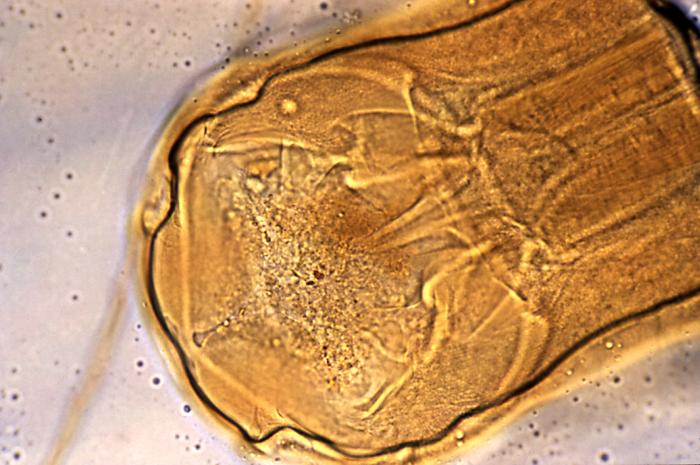A team led by researchers at the George Washington University (GW) has established a controlled human hookworm infection (CHHI) model to accelerate the development of human hookworm vaccines.

Image/CDC
Investigators at the GW School of Medicine and Health Sciences, with a $1.2 million grant from Wellcome Trust, are partnering with Institute René Rachou (IRR) in Brazil to produce the infection model and establish a hookworm vaccine challenge model (HVCM) for two of the most advanced hookworm vaccine candidate antigens in endemic areas.
Approximately 576-740 million people worldwide are infected with hookworm, according to the Centers for Disease Control. Hookworms are parasitic worms that live in the small intestine and can be transmitted through the feces of an infected person, which can contaminate food and water supply in an area.
“The CHHI model has been shown to be safe and well-tolerated and reliably induces hookworm naïve adults challenged with NaL3 [Necator americanus larvae] produced in the current Good Manufacturing Practice facility at GW,” said Jeffrey Bethony, PhD, professor of microbiology, immunology, and tropical medicine at the GW School of Medicine and Health Sciences and a co-PI on the study.
With the award, the research team will establish a Necator donor program to ensure continual production of NaL3 in Belo Horizonte, Brazil. At an IRR field site, they will also initiate a dose escalation study in adults previously infected with hookworm to determine a dose of NaL3 that is well tolerated and reliably induces infection, and will also run a hookworm vaccination-challenge model trial of two lead human hookworm vaccine antigens.
“In the HVCM, adults from Necator-endemic areas will be vaccinated and then challenged with NaL3,” said David Diemert, MD, professor of medicine at the GW School of Medicine and Health Sciences and a co-PI on the study. “This will enable early evaluation of human hookworm vaccine efficacy before conducting conventional Phase 3 trials in hookworm-endemic areas, which largely require large sample sizes and lengthy duration.”
Bethony and Diemert have partnered previously with IRR to test vaccines against hookworm, schistosomiasis, and Zika.
The project, “Controlled Infection to Test Efficacy of Human Hookworm Vaccines in Necator-endemic areas of Brazil,” is funded through January 2025.


One thought on “Vaccine researchers testing human hookworm vaccines in Brazil”